Contents
Not too experienced gardeners are advised to choose not varieties, but eggplant hybrids. They are distinguished by greater endurance to negative external influences, better immunity, and good yields. All these criteria are met by the hybrid eggplant Fabina F1, and as an additional bonus, its taste can be noted.
History of breeding
Fabina F1 is a first-generation eggplant hybrid native to France. The originator is the well-known agricultural company Claus. At home, he appeared in the “open access” in the early 2000s, an application for registration for sale in Our Country was filed in 2005. The hybrid passed the necessary official variety tests quickly. Since 2007, it has been listed in the domestic State Register of Breeding Achievements.
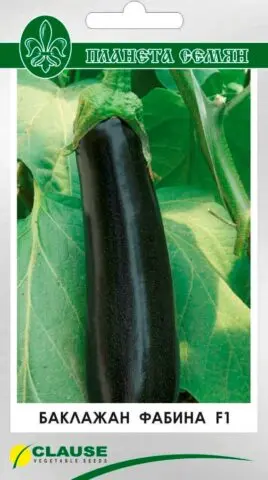
In Our Country, you can buy eggplant seeds Fabina F1, produced by both the originator and domestic agricultural firms under license
Description and characteristics of eggplant Fabina F1
Outwardly, the eggplant bushes Fabina F1 do not stand out among the “relatives”. However, their fruits immediately attract attention with external presentability. Therefore, the hybrid is appreciated not only by amateur gardeners, but also by professional farmers.
Appearance
Eggplant bushes Fabina F1 reach a height of 45-60 cm. The plants are semi-spreading, the stem is quite powerful, erect, withstands the severity of the crop.
Bushes are densely leafy. The leaf plates are large, the edge is cut with clear “teeth”. The flowers are also large, bisexual, collected in inflorescences of 2-7 pieces.
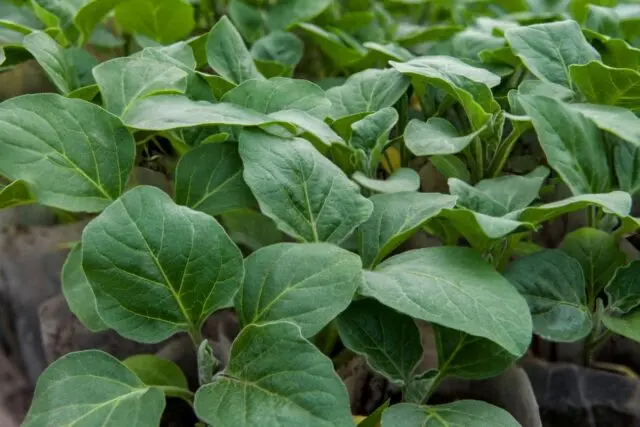
The hybrid is characterized by the almost complete absence of the “edge” on the stem and a subtle ink-violet tint.
The fruits of the Fabina F1 hybrid are cylindrical, with a very dark purple skin, which looks black from a distance, and in the sun acquires a pronounced glossy sheen. The spines of the peduncle are few. The approximate length of the fruit is 20-23 cm, the thickness is 4-5 cm.
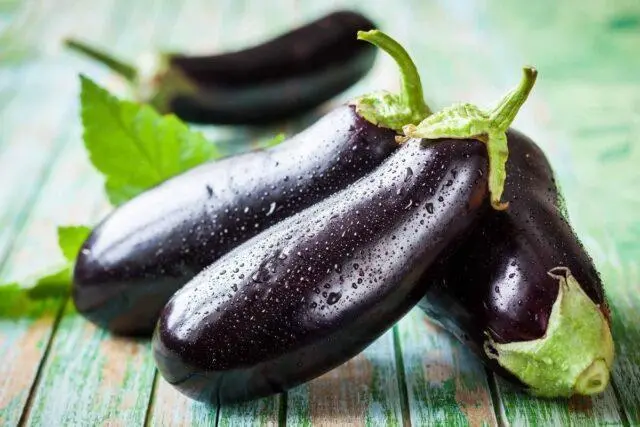
The mass of eggplant Fabina F1 varies between 160-220 g
Taste and purpose
The skin is thin, almost imperceptible when eating, but at the same time dense, ensuring safety during transportation over long distances and a keeping quality of 90%. The flesh is whitish or greenish, dense and very delicate in texture.
The taste of eggplant Fabina F1 is officially rated as “excellent”. The absence of bitterness is laid down at the genetic level. “Mushroom” aftertaste notes are clearly expressed. They are preserved both in any dishes after heat treatment, and in homemade preparations.

In terms of use in cooking, the hybrid is universal
Terms of maturation
In terms of ripening eggplant Fabina F1 belongs to the category of mid-season. Harvest time falls on August-September, 90-105 days pass from the moment of seed germination. The specific time depends on how favorable the weather was in summer.
Productivity
The yield of eggplant Fabina F1, demonstrated during variety trials in Our Country, amounted to 306-355 centners per hectare. According to this indicator, the hybrid significantly “outstripped” the varieties chosen as “reference” ones – Almaz and Lebediny (240-340 c/ha).
On the bush, 6-9 eggplants Fabina F1 ripen at the same time. Their regular cutting stimulates the formation of new fruit ovaries. Considering that the fruiting period of the hybrid is extended, an amateur gardener can count on 7-7,5 kg / m².
Growing regions
Officially, the Fabina F1 eggplant is recommended by the State Register for cultivation in the North Caucasus. However, indoors, he feels good in regions with a temperate climate, almost throughout the European part of Our Country.
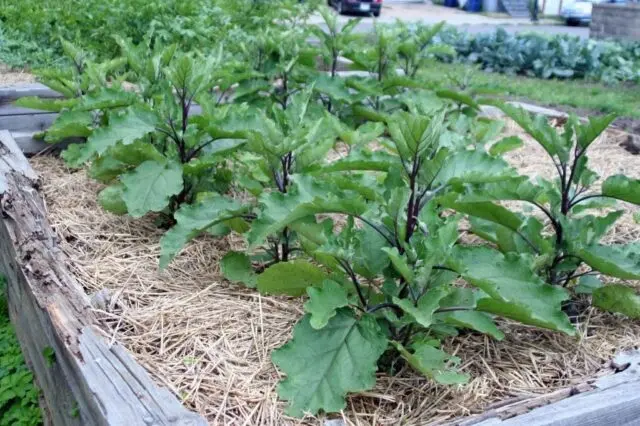
Of the former Soviet republics, culture is best “taken root” in Moldova and Ukraine
More severe conditions for a hybrid are too uncomfortable. In the Urals, in Siberia, in the Far East, plants develop slowly, the yield of Fabin F1 eggplant is significantly reduced, the taste of the fruit deteriorates.
Advantages and disadvantages
Eggplants Fabina F1 reach technical ripeness in 50-55 days. Fruits, the length of which does not exceed 10-15 cm, are considered delicacy, their flesh is softer and juicier than fully ripe ones.
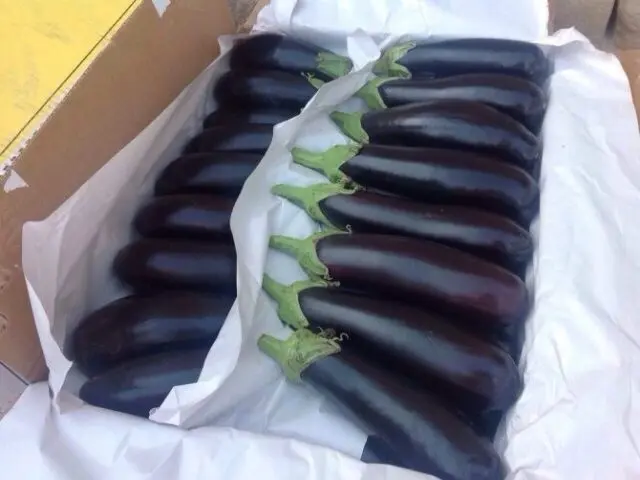
After heat treatment, the flesh of Fabina F1 eggplant retains its density and texture uniformity, does not turn into a “slurry”
Pros:
- general endurance and “stress resistance”, the ability to survive many vagaries of the weather without harming oneself;
- yields are consistently above average for the crop;
- extremely high percentage of marketable fruits;
- fruiting extended over several months;
- the presence of immunity against verticillosis, protection against spider mite attacks, in general, good resistance to pathogens and pests with proper care;
- excellent transportability and keeping quality;
- comparative compactness of plants;
- a powerful stem that allows you to do without a garter and installation of supports;
- external presentability, regular shape, one-dimensional fruit;
- excellent taste, thin skin, a minimum of seeds in the pulp;
- universal purpose of eggplant Fabina F1 in cooking.
Cons:
- the inability to obtain seeds from self-grown fruits for planting next year;
- few, but well palpable when harvesting with bare hands, spikes at the stem;
- exactingness to regular watering and good lighting.
Growing seedlings
Fabina F1 eggplant seeds are sown no earlier than the end of February and during March (depending on the region). Preplant preparation includes dressing in a solution of a fungicide and a biostimulant.
At a temperature of 24-27 ° C and an air humidity of 70-75%, seedlings from Fabina F1 eggplant seeds appear quickly (within 8-10 days) and “friendly”. If it drops to 15 ° C, the seedlings stop developing. The critical minimum at which they die is 12-13 °C. Caring for them does not differ from the standard for any seedlings, the conditions of detention, too.
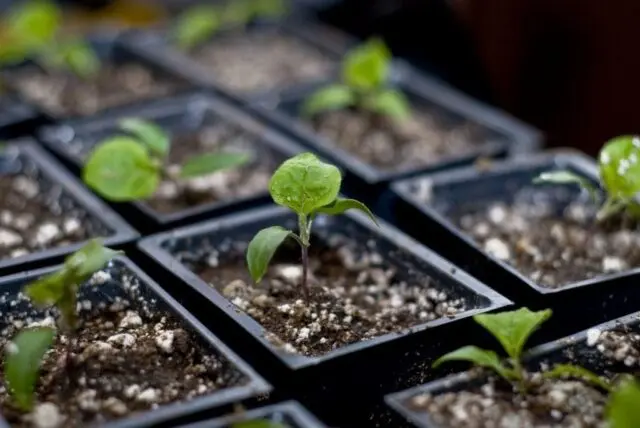
To avoid picking, it is advisable to immediately plant the seeds in separate containers filled with universal soil for seedlings.
Transplanting seedlings into the ground
Fabin eggplant seedlings are transferred to the beds only when the likelihood of return frosts is minimized. In central Our Country, this is the second half of May. Seedlings at the age of 45-50 days are already stretched up to 10-12 cm, have 4-6 true leaves. The recommended landing pattern is 30-40*70-80 cm.
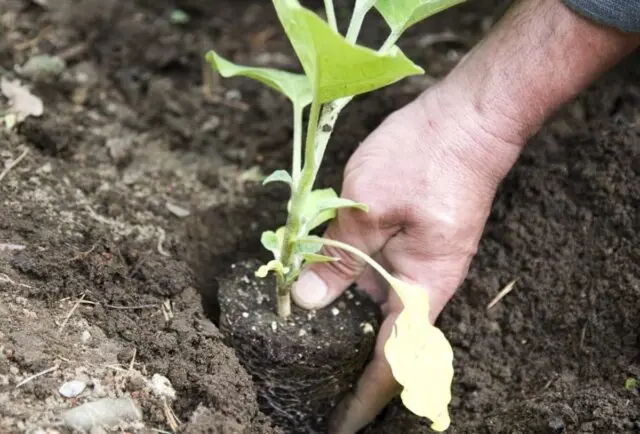
1-2 plants are placed per 3 m²
Further Care
Mandatory agrotechnical measures for eggplant Fabina F1:
- Watering. With a lack of moisture, buds, flowers and ovaries fall off en masse, with an excess of moisture, the roots quickly rot. Eggplant Fabina F1 is watered as the surface layer of the substrate dries 1,5-2 cm deep (every 5-7 days). The norm is 12-15 l / m².
- Top dressing. Since the yield of the hybrid is above average, it is advisable to use complex specialized fertilizers. For the first time, bushes are fed 12-15 days after planting in the ground, then at intervals of 2,5-3,5 weeks (up to 5 times per season). After the start of flowering, fertilizers containing a lot of nitrogen will not work.
- Mulching. Allows you to increase the intervals between watering, less often loosen and weed the beds. Provides protection against some pests.
- preventive treatments. With the development of the disease in neighboring beds or “massive” attacks of pests, it is recommended to spray Fabina F1 eggplants in advance with a solution of a suitable insecticide or fungicide for safety reasons.
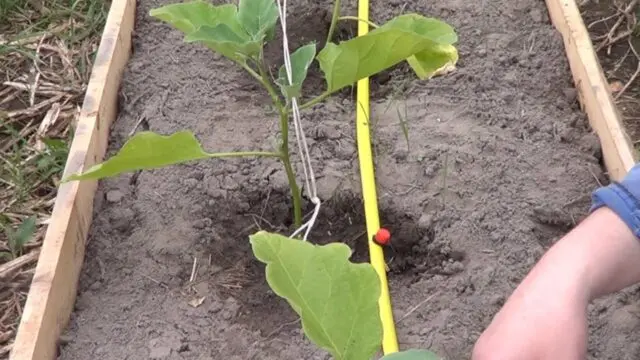
Drops of water when watering should not fall on plants
Conclusion
Eggplant Fabina F1 is appreciated by both amateur gardeners and professional farmers. Among its undoubted advantages are general endurance, including the ability to resist the effects of negative environmental factors and good immunity, comparative ease of care, very good yield, outstanding fruit taste.









